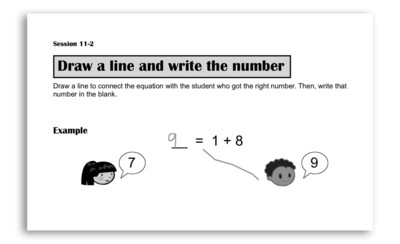Research
Original Product: Nontraditional Arithmetic Practice

One factor that makes it difficult to understand math equivalence is narrow experience with the traditional arithmetic problem format (e.g., 3 + 4 = _). Curriculum, teachers, parents, books, and educational toys all tend to present arithmetic problems in this traditional "operations = answer" format. Prof. McNeil and the CLAD Lab team originally hypothesized that it might be sufficient to expose children to a variety of non-traditional arithmetic problem formats. With funding from the Institute of Education Sciences, they used a mixed methods approach involving both design-based research and experiments and found that specific modifications to arithmetic practice, such as writing the problem with the operations on the right side of the equal sign (e.g., _ = 3 + 4), using the words "is equal to" and "is the same amount as" in place of the equal sign, and grouping problems by equivalent values (e.g., 3 + 4, 5 + 2, 1 + 6) help children construct a formal understanding of equivalence.
These modifications were combined to create a non-traditional arithmetic practice workbook that was tested in classroom-based experiment that met What Works Clearinghouse Standards without reservations. This experiment showed that children who practice arithmetic in the non-traditional way construct a better understanding of math equivalence than do children who practice in the traditional way.
It Worked! Why Not Stop There?
Non-traditional arithmetic practice alone is easy to implement and it works, but it is not enough on its own to help all students construct a formal understanding of mathematical equivalence. For this reason, Prof. McNeil and CLAD Lab graduate student Caroline Hornburg (now Prof. Hornburg at Virginia Tech) worked together with two expert teachers, Heather Brletic-Shipley and Julia Matthews, to continue the iterative development process. They tested out additional components that the research literature suggested would help children construct understanding and ultimately found that it would be beneficial to incorporate three additional components into a more comprehensive intervention that goes beyond nontraditional arithmetic practice. Thus, the current version of ICUE includes three components *IN ADDITION TO* nontraditional arithmetic practice. Thus, the four components of ICUE include the following: (a) introducing the equal sign outside of an arithmetic context first before using it in arithmetic contexts, (b) concreteness fading, (c) varying the problem format and structure of arithmetic practice, and (d) asking children to compare different problem types and different problem-solving strategies.
One small classroom-based experiment and a larger efficacy study have both found strong evidence that incorporating all four components of ICUE improves children's formal understanding of mathematical equivalence beyond the improvements achieved by spending the full learning time on non-traditional arithmetic practice alone.
Selected References
McNeil, N. M., Hornburg, C. B., Brletic-Shipley, H., & Matthews, J. M. (2019). Improving children's understanding of mathematical equivalence via an intervention that goes beyond nontraditional arithmetic practice. Journal of Educational Psychology, 111, 1023-1044.
McNeil, N. M. (2014). A change-resistance account of children's difficulties understanding mathematical equivalence. Child Development Perspectives, 8, 42-47.
McNeil, N. M., Chesney, D. L., Matthews, P. G., Fyfe, E. R., Petersen, L. A., Dunwiddie, A. E., & Wheeler, M. C. (2012). It pays to be organized: Organizing arithmetic practice around equivalent values facilitates understanding of math equivalence. Journal of Educational Psychology, 104, 1109-1121.
McNeil, N. M., Fyfe, E. R., Petersen, L. A., Dunwiddie, A. E., & Brletic-Shipley, H. (2011). Benefits of practicing 4 = 2 + 2: Nontraditional problem formats facilitate children's understanding of mathematical equivalence. Child Development, 82, 1620-1633.
McNeil, N. M., & Alibali, M. W. (2005b). Why won’t you change your mind? Knowledge of operational patterns hinders learning and performance on equations. Child Development, 76, 883-899.
Davenport, J., Kao, Y., Johannes, K., Hornburg, C. B., & McNeil, N. M. (2022). Improving children’s understanding of mathematical equivalence: An efficacy study. Journal for Research on Educational Effectiveness. DOI: 10.1080/19345747.2022.2144787